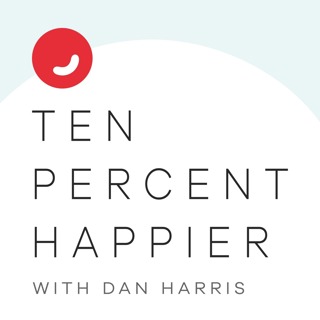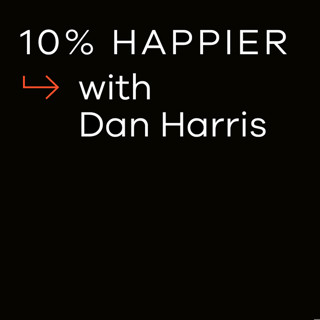
Claire Hoffman
Author and journalist Claire Hoffman has been practicing Transcendental Meditation since she was 3 years old. When she was 5, she and her family moved to a secluded meditation community in Fairfield, Iowa -- Maharishi's national headquarters for Heaven and Earth. In her new memoir, "Greetings from Utopia Park: Surviving a Transcendent Childhood," Hoffman describes what it was like to grow up in a place where people aspired to follow all of Maharishi's principles, what happened after she began to question them, and how she feels about her spiritual upbringing now as an adult.
13 Juli 20161h 7min

Dr. Amishi Jha & Maj. Gen. Walter Piatt
Dr. Amishi Jha, a neuroscientist and an associate professor of psychology at the University of Miami, and Maj. Gen. Walter Piatt of the U.S. Army might seem like an unlikely pair, but they have worked together to bring Mindfulness to the troops. Jha studies how the demands of high-stress, high-stakes professions may degrade the brain's ability to make decisions and she has found in her work that groups like accountants, students, athletes and military service members benefit from Mindfulness training. Piatt has served in numerous assignments all over the world, including tours in Korea and Panama, in his more than 35-year military career. He's also completed several operational deployments including Bosnia, Kosovo, Afghanistan and Iraq.
6 Juli 201654min

Mario Batali
World-renowned chef Mario Batali has 28 restaurants, 10 cookbooks, a daytime cooking show, a food emporium in New York City, and now plans for a food theme park. He also -- somehow -- finds time to keep a daily meditation routine. Batali says he started practicing mantra-based Transcendental Meditation (TM) six years ago after Jerry Seinfeld and his wife, Jessica, suggested he look into it. Batali said he now practices twice a day for 20 minutes, and that it's helped calm his temper.
29 Juni 201638min

Dr. Mark Epstein
Buddhist psychiatrist and author Dr. Mark Epstein has for years written about the overlap between Western psychotherapy and Eastern Buddhist philosophies. Epstein sat down with Dan Harris to talk about the impact meditation can have on the mind, both positive and negative, for those looking for an escape from suffering. He also went deep into the Buddhist concept of the "no-self," whether Enlightenment can be reached ... and what it might look or feel like. He has written numerous books on these topics, his most recent being, "The Trauma of Everyday Life." Epstein first discovered meditation in college and one of the "breakthroughs" he said that made the practice click for him happened while he was learning to juggle. "Once I got the three oranges in the air, my mind had to relax in order to keep it going and I understood, 'Oh yeah, this is what they're trying to teach me in mediation.'" Before he found meditation, Epstein said he was a very anxious person who worried all the time. Now after practicing meditation for more than 40 years, Epstein said he wouldn't know what he would be without it.
22 Juni 20161h 8min

Arianna Huffington
Arianna Huffington has a multimillion-dollar media website that reacts to world events by the millisecond, she's a mother of two -- and yet she says she always gets a good night's sleep. Not only that, she says wants to help everyone else do the same. Huffington, the co-founder and editor-in-chief of The Huffington Post, has a new book -- her fifteenth -- called "The Sleep Revolution: Transforming Your Life One Night at a Time." In the book, she traces sleep deprivation back to the Industrial Revolution and argues that our culture's chronic need to be "plugged in" is hurting our health, productivity, relationships and happiness. She started researching the effects of sleep deprivation after she collapsed from exhaustion in 2007, two years after launching The Huffington Post. It was also around this time, Huffington said, that she went back to meditation, a practice she had first started at age 13 while living in her home country of Greece.
15 Juni 20161h

Adam Shankman
Acclaimed movie producer and director Adam Shankman is best known for his upbeat, family-friendly movies, including "Hairspray," "A Walk to Remember" and "The Pacifier," but behind the scenes, Shankman says he spent years grappling with substance abuse and self-loathing. Growing up in Hollywood, Shankman, who is openly gay, remembers being "an incredibly happy kid." But when he was three years old, he says, his parents set him up with a doctor who was doing a study on sexual identity. Unbeknownst to his parents at the time, Shankman says he was placed in "conversion therapy." When he was a teen, Shankman turned to alcohol and later drugs to quiet the "ugly voice" in his head. In 2012, Shankman says, he entered a "really dark" place and the following year checked himself into a month-long rehab program -- where he discovered meditation.
8 Juni 201641min

Emma Seppala
Success and happiness: Can you have one without the other? Many may assume that these two things are at cross purposes but Emma Seppala, the science director of Stanford University's Center for Compassion and Altruism Research and Education, argues that that assumption is actually dead wrong. The Ph.D. holder and author of "The Happiness Track" sat down with Dan Harris to tackle this subject -- a central theme in Dan's own book, "10% Happier."
5 Juni 201654min

Chade-Meng Tan
Chade-Meng Tan was employee No. 107 at Google. But the software engineer's career took a turn when he began teaching meditation to the company's employees and executives, adopting the job title of "Jolly Good Fellow." While he's no longer at Google, Meng -- as everyone calls him -- continues to meditate and has written a new book, "Joy on Demand," detailing how anyone can access joy through meditation.
1 Juni 201653min






















